Hello,
I’m so glad to hear that your dog is still with us and improving. I also think that your question is wonderful! Here’s what I did with Hank. I did lots and lots and more lots of massage and passive range of motion. I also placed him with support and encouraged him to just stand. I would hold his sternum and place his back legs (a little wider than normal) and just try to hold him there. Like teaching a baby to walk. I did this all the time. I know people are afraid of hurting them but the problem with paralysis is muscle atrophy. Which happens really really quick. Like in days. So I pushed him hard to keep trying and to wake his brain up to talk to his muscles. I hope this helps. Good luck. Keep us posted.
My cat was taken in to the vet in May to treat allergies, difficulty breathing (snoring sounds) and a head tilt. Was given an anti inflammatory, antibiotic (convenia), vitamin b-12, ear drops, and an X-ray. Diagnosed with asthma brought on by allergies. Lungs ok. Three weeks later breathing and itching had improved, but third eyelid started showing.
Vet would not see him and said to go to a specialist.
Took the cat for a second opinion. That vet said we should check for nasal polyps. Was sedated and had an exam of ears and throat. No polyps were visible. Vet felt a small enlarged area under the soft palate, but could not confirm this was a polyp. Head tilting stopped after first visit. Recurred a few days ago. Not present now. Second vet recommended going to a specialist for ct scan. It is cost prohibitive and I’m not sure it is necessary. Third opinion from an online site recommended we try antibiotics for the respiratory issues. Started on one antibiotic today for ten days. And started on purina fortiflora.
Looking for any other advice or experience with issues like this. I’ve never had a cat with these problems.
Thanks.
#cats #nasal #headtilt #respiratory #polyps
Comments
IVDD – Beagle.
Hi, I reached out a few weeks ago because my dog was diagnosed with IVDD but could not use the bathroom on his own and it was next to impossible to express him. After a couple of weeks of manually catheterizing him, he started to use the bathroom on his own regularly. He also started to regain a lot of strength back, especially in his back legs. The problem area is in his neck but he is able to wag his tail and turn his neck all around. He still cannot walk, he can hold his backend up but his front two paws continue to knuckle and go under him when he tries to walk. I watched the videos on Hank and I know he had a similar issue but you did not go into depth as one video his front paws didn’t work and then the next video all of a sudden he was walking. Is there anything I can do to speed up this process or help him? I’m so proud of how hard he’s come and I don’t want to give up now.
Comments
I have an 9 year old spayed female pit/terrier mix with a history of liver disease. She has recently been getting hairless black spots showing up on her sides and legs, especially in the rear. Her biopsy came back as possibly ischemic dermatomyosits. The antibiotic that her vet put her on seems to have made no difference, and the fish oil and vit E are A) difficult to give her and B) she hasn’t been on them long enough to know if they are helping. She has no apparent muscle involvement. Would doing blood studies for autoimmune diseases help me get a better plan for treatment? What specialist would be best to manage her care? Any information or help in this problem would really be appreciated!
Comments
Can Interceptor cause bowel problems. Our 1 year old Golden seems to have tummy issues a few days after her heartworm
Comments
Hi Dr. Magnifico. I realized the geriatric diet is chicken based, which gives Dottie hives. Would the liver diet work with some kind of supplement we could add to it? Maybe some pumpkin or something? I have been trying to find low protein, fish based geriatric foods for dogs with liver and kidney problems. Thank you!
Comments
I have 3 cats and have some litter box issues. I used to have the covered boxes, but noticed that one of the cats was peeing outside the box. So I removed all of the lids. The problem seemed to stop, but then started again on occasion. I bought larger boxes, (I have three of them) and the issue still occurs. I finally discovered it was my cat with colitis. She does pee in the box, but gets so close to the edge or stands instead of squats that it goes outside the box. Is she doing this because of the colitis or a behavior issue? perhaps higher sided boxes would help? I keep the areas lined with pee pads, but they are no match for cat urine. Suggestions?
Comments
Hi pawbly friends- 2 questions. First, is there a number to report dead bald eagles to? We have 2 (pretty sure it’s 2) carcasses in the feed field behind our house which I find quite strange. Second, our 2 younger GSDs got ahold of part of one and got into a scuffle over it. One got the other in the forepaw with a canine and punctured it. I have antibiotics (cephalexin) and have cleaned it with the blue solution we have from the vet for such unfortunate events. I’ve put antibiotic ointment on it and have it bandaged up. Vet office is closed at the moment….will make a phone call tomorrow to them. Thinking we are ok or the time being. He is running around on it no problems at th moment.
Comments
My vet says my dog has a severe loss of bone density and that its genetic. Apparently he tried giving vitamin d, calcium and phospor to some other dog with the same problem but it didnt help at all. Apparently it was even worse.
DOES ANYONE KNOW HOW CAN I HELP MY DOG? He already had 2 surgeries (fho, patella). He is only 2 years old. 🙁









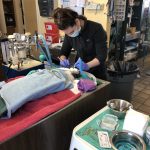

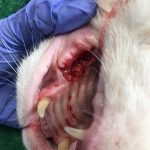
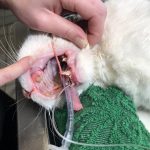
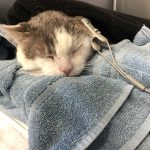

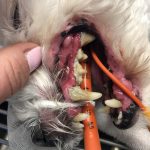



Hello,
This is a tough one. The problem really lies in the inability to localize and identify the lesion causing all of the clinical signs. I would look into Horners Syndrome and see a cat specialist. I also would consider a long discussion with a trusted vet on what is treatable and what isn’t based on most likely diagnosis. That’s really what you need. Help from someone who will talk about your case within your budget and comfort zone. I have to add one more thing. It really bugs the heck out of me to have a vet who won’t talk to you further after you discuss and confide in your inability to see a specialist (who will likely want a ct that you also can’t afford). Sorry. Soapbox moment.
Keep me posted on your cats status please.
Thank you. I just found your videos on removing nasal polyps on you tube. Was so hopeful yesterday that the second opinion vet who did the exam with Lucas under anesthesia would find a polyp in his throat and remove it. But instead she said she felt something kidney bean size under his soft palate. She wasn’t real confident of what it was. I went for the second opinion and told them I could not do the specialist route due to cost. Then I ended up being told I need to go see a specialist and spend 1-2 thousand for a CT. After that I could not pay for anymore treatment. So I searched around and had a vet online recommend the antibiotics. No one yet has given me options. Although the second vet said well he could live with polyps. I said but he is getting worse. The head tilt went away and came back. She said nothing else. I feel like I’m in an airport being moved through the system in the midst of storms that no on wants to discuss. And when I ask questions like can we give him steroids for inflammation – she says oh no I wouldn’t do that.
I am scheduled for a consult with a vet from Cornell on Sunday. Maybe that will help.
The other option I’m considering is just paying for a consult with a specialist – internal medicine I guess. When you call they won’t tell you what anything costs until you beg them. So I am leary of spending more money twith a specialist who may tell me they can’t do anything until I spend even more money on a ct.
Sorry, frustrating week.
Here’s Lucas – before the Horners syndrome started.
Hello,
I completely understand your frustration. For al of the reasons you mention we added a storyline section to this site. If you can please add a story of your experience at each vet you went to and include the prices of each visit. I hope it is a way for others to see what the cost of care is and even which bets are affordable and helpful. Stories are entered by service provider. So each visit is entered separately but reference that you added one for each. It is a new feature so let me know if you have any questions or problems. We really are working hard to help people like you. Keep us posted. Good luck. Ps I think Cornell is a great option.
For more information on this subject please see these credible resource pages; ACVS Nasopharyngeal Polyps; https://www.acvs.org/small-animal/nasopharyngeal-polyps
Dr Magnifico, this is the link you posted. Figure 5 sounds like what Lucas has – a small polyp under his soft palate. Is this a surgery that a general practice cat vet could perform. Or only a surgeon. Cost is an issue for me. But I want to help Lucas before things get worse. Thanks.
It says the mass will regrow with the simple removal shown. But it would be some relief and I’m not sure how fast they grow. Thanks.
Went to a new vet today. What a difference from the others! Quiet, calm environment. Cats only patients. The vet was so thorough. Spent a long time with Lucas. When Lucas got anxious, he allowed him to go back into his carrier and calm down. Then he continued the exam by removing the top of the carrier. Lucas stayed in the corner and was much calmer. Going to try a new antibiotic – to hit what might be a middle ear infection. Onward!
Awesome! Sounds like you made great helpful progress. Very best of luck.
Thanks Dr Magnifico,
The consulting vet from Cornell recommended I find a good vet interested in pursuing what is going on with Lucas, and listening to me regarding my budget. That was the same advice you gave! By the way the Cornell consult was excellent. The vet was very familiar with nasal polyps – and did not feel like this is the problem.